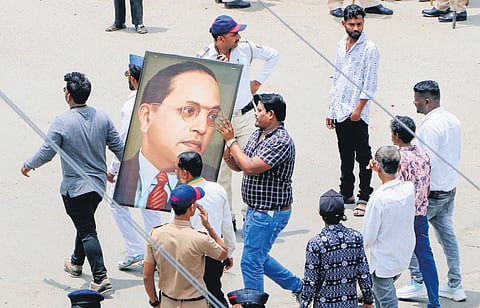

NEW DELHI: The Centre seems to be dragging its feet on the recent Supreme Court order allowing the state governments to sub-classify Scheduled Castes and Scheduled Tribes (SC/ST). The ruling party says that it doesn’t want to hurry into any decisions on the matter.
The government is in talks with relevant stakeholders and will take a call at an appropriate time, according to BJP national spokesperson and Dalit leader Guru Prakash Paswan.
On August 1 this year, the apex court, in a majority ruling, allowed state governments to sub-classify SC/STs to make policies for the cause of affirmative action. It ruled that states devise a policy to identify and exclude the creamy layer from the SC/ST categories.
Facing pressure from within the BJP and its key allies JD(U) and TDP, the Centre took a step back on the ‘creamy layer’ issue. It clarified that it will not implement the court’s proposal of carving out the creamy layer within SC/ST reservations.
However, the Modi government is yet to spell out its stand on the state governments’ power to sub-classify SC/STs, as its key allies are divided over it.
The sub-categorisation is also expected to dominate the political landscape in the upcoming elections in Haryana, which has 20 per cent Dalit population. While Dalit groups oppose sub-classification, the BJP government in Haryana has approved the state commission’s recommendations for sub-classification of SCs. The BJP is in a quandary, as other poll-bound states, Maharashtra and Jharkhand, also have sizeable Dalit and tribal population.
Speaking to this newspaper, Dalit leader Guru Prakash Paswan said that the government is not in a hurry to take any decision on the issue as different states have different issues attached to it. “The government is taking its own time. It is studying the Supreme Court judgment and interacting with all relevant stakeholders. The government will take a call at an appropriate time,” said Paswan.
Though the ambiguity continues on the Centre’s part, NDA ally Telugu Desam party (TDP) has strongly rooted for the verdict allowing state governments to go ahead with sub-categorisation. During an interaction with this newspaper, TDP leader and Union Civil Aviation Minister Ram Mohan Naidu had said that Andhra Pradesh Chief Minister Chandrababu Naidu hailed the verdict passed by the Supreme Court on sub-categorisation, which remains the stated position of the party. The Naidu government had, in 1997, introduced SC categorisation in the state.
The Modi 2.0 government has also set up a high-level committee in January this year, led by Cabinet Secretary, to address the inequality within the SC communities. It was perceived that the move was to reach out to the Madiga community in Telangana and Andhra Pradesh.
Among the NDA’s other allies, the Lok Janshakti Party (Ram Vilas) has opposed sub-classification, while the JD(U) said that the Nitish Kumar government has already implemented the sub-categorisation among Dalit groups.
Meanwhile, Dalit groups are all set to approach the Supreme Court for a review of the verdict. Ashok Bharti, chairman of the National Commission for Scheduled Castes, said that they will intensify the protests and demanded that the government must reject the Supreme Court judgment.
“The BJP will face electoral setbacks in Haryana and other states. We have submitted a memorandum to the PMO and will soon approach the Supreme Court with a review petition,” he said.
Several Opposition parties including Congress, RJD and BSP, and NDA ally LJP(RV) have extended support to a nationwide strike called by Dalit and Adivasi organisations last week on the issue.